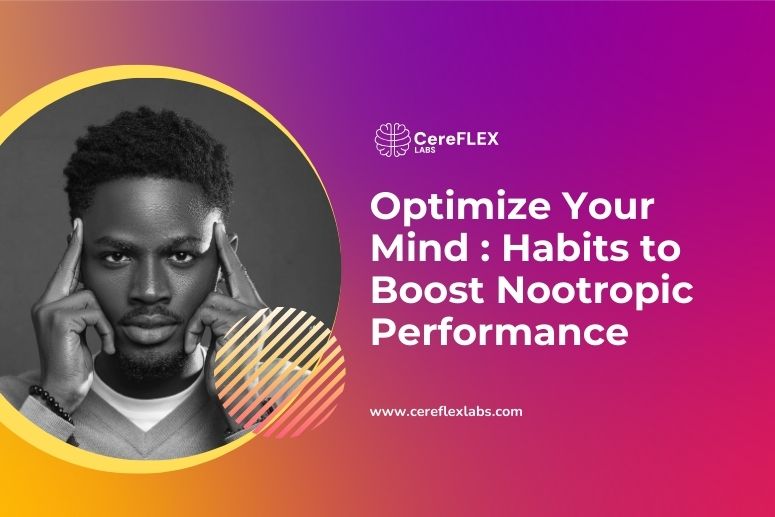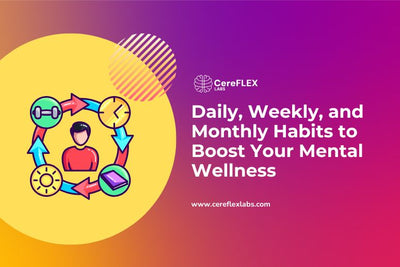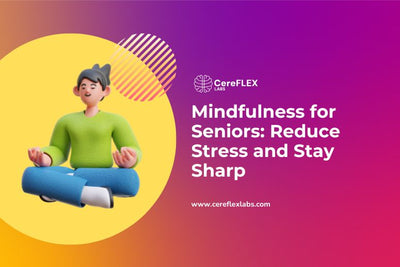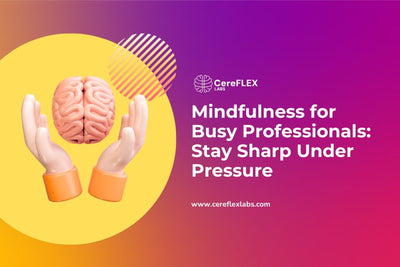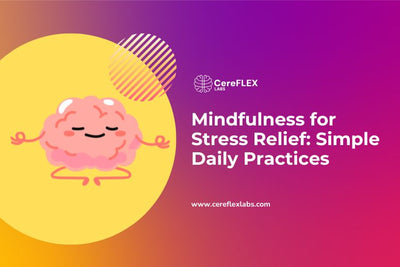Taking nootropics is just the beginning; their true potential lies in how you support them!
If you're exploring cognitive enhancers, or even considering natural cognitive enhancers, you're already on a path to boosting focus, memory, and mental clarity. But supplements work best when paired with daily habits that help your brain thrive.
This isn’t about doing more — it’s about aligning your actions with your goals. When your lifestyle habits are in sync with your nootropic routine, you create an environment where cognitive performance can improve naturally over time.
Let’s dive into the daily behaviours that can help amplify the effects of nootropics and support your brain’s full potential.

The Synergy Between Nootropics and Lifestyle
Nootropics aren’t shortcuts to better brain health — they work best when they support a strong cognitive foundation.
These supplements may enhance neurotransmitter activity, blood flow, neuroplasticity, or energy metabolism. But without quality sleep, proper nutrition, hydration, and stress management, their effects can be limited.
Think of nootropics as high-octane fuel: valuable on its own, but most effective when the engine (your brain) is well cared for.
Adding simple, evidence-based habits into your routine doesn’t complicate your life — it strengthens it. And when these habits work in harmony with nootropics, the results are often more focused attention, better recall, and longer-lasting mental energy.
What daily habits enhance the effectiveness of nootropics?
To get the most from your nootropic routine, your brain needs consistent support from the rest of your body.
The following seven lifestyle habits are backed by science and help create ideal conditions for nootropics to work. They're simple to start, easy to maintain, and powerful in the long run — supporting memory, focus, and sustained mental energy.

1. Move Your Body: How Exercise Boosts Nootropic Effects
Exercise isn’t just good for your heart — it’s a cognitive amplifier. When paired with nootropics, physical activity helps fuel the brain in ways that make supplements more effective.
Here’s how movement enhances mental performance:
✔ It increases blood flow, delivering oxygen and nutrients directly to the brain
✔ It supports the release of growth factors that nourish neurons and promote neuroplasticity
✔ It reduces inflammation and insulin resistance — two factors linked to cognitive decline
✔ It naturally lifts mood and improves sleep, both critical to brain recovery
In short, regular workouts help create the brain environment that nootropics are designed to support. Whether it’s a walk, gym session, or yoga class, movement multiplies mental performance.

2. Eat for Focus: How a Balanced Diet Supports Cognitive Enhancers
What you eat plays a key role in how well your brain — and your nootropics — perform. Nutrient-rich foods provide the raw materials your brain uses to stay alert, process information, and adapt to mental demands.
When combined with a nootropic routine, a well-balanced, brain-focused diet helps:
✔ Support neurotransmitter production
✔ Reduce oxidative stress and inflammation
✔ Improve nutrient absorption and energy metabolism
Top brain-boosting foods to include:
- Oily fish (rich in omega-3s for brain cell function)
- Leafy greens (loaded with folate and antioxidants)
- Berries (high in polyphenols that protect neurons)
- Eggs (a great source of choline, vital for memory)
- Avocados and beets (improve blood flow to the brain)
- Dark chocolate (small amounts can boost mood and focus)
Food is fuel — and when it's the right kind, it works with your nootropics to help you think clearly and stay focused longer.
3. Prioritize Quality Sleep: Fuel Recovery and Cognitive Gains
Sleep is where your brain consolidates memory, clears waste, and resets for peak performance. Without enough rest, even the best nootropic stack won’t deliver its full potential.
Research shows that disrupted sleep impairs focus, slows reaction time, and undermines decision-making — all functions that cognitive enhancers aim to support.
Good sleep hygiene also improves how your body processes nutrients, repairs neurons, and responds to stress. It forms the foundation for long-term mental clarity.
Here’s how to support better sleep:
- Keep a consistent bedtime and wake-up routine
- Avoid screens 60 minutes before bed
- Limit caffeine intake in the afternoon
- Create a sleep-friendly environment: cool, dark, and quiet
- Build a calming routine: reading, journaling, or light stretching
Want to go deeper? Explore the importance of sleep in cognitive performance to learn how it directly influences brain function.

4. Practice Mindfulness: Manage Stress to Maximize Mental Clarity
Chronic stress doesn’t just wear you down — it interferes with memory, focus, and your brain’s ability to benefit from nootropics. Elevated cortisol levels can disrupt sleep, reduce plasticity, and slow neurotransmitter activity.
Mindfulness offers a powerful counterbalance.
By calming the nervous system and reducing stress hormones, mindfulness creates the mental space nootropics are designed to support. Practices like meditation, deep breathing, or gentle yoga can:
✔ Lower cortisol and blood pressure
✔ Improve sleep quality and emotional regulation
✔ Enhance focus and working memory
✔ Promote long-term brain resilience
Whether it’s five minutes of breathing, guided meditation, or a quiet walk, mindfulness builds consistency. The benefits of mindfulness for brain health go far beyond relaxation — they strengthen the neural networks that cognitive enhancers aim to support.
5. Stay Mentally Active: Strengthen Cognitive Pathways
Your brain thrives on challenge. Mentally engaging activities strengthen existing neural connections and may even promote new ones — a process known as neuroplasticity.
When paired with nootropics, mentally stimulating habits can help reinforce the pathways these supplements are designed to support.
Research shows that cognitive training activities may:
- Improve processing speed and working memory
- Build cognitive reserve that helps protect against future decline
- Enhance adaptability in problem-solving and learning
Easy ways to stay sharp include:
- Crossword puzzles or Sudoku
- Reading fiction or non-fiction
- Learning a new skill or language
- Strategy games, card games, or brain-training apps
Think of this as cross-training for your mind. When you keep your brain active, you’re not just maintaining — you’re evolving.
6. Remain Socially Involved: Build Cognitive and Emotional Resilience
Human connection isn’t just good for your mood — it’s essential for brain health. Regular social interaction helps regulate emotions, improve cognitive flexibility, and build mental resilience over time.
Studies link strong social ties with slower cognitive decline, better memory retention, and improved problem-solving — all of which complement the goals of nootropic use.
Whether through casual conversations or shared activities, social engagement can:
✔ Activate multiple brain regions simultaneously
✔ Reinforce communication and empathy pathways
✔ Help reduce stress and feelings of isolation
Simple ways to stay connected:
- Join a club or discussion group
- Set weekly catch-ups with friends or family
- Collaborate on a hobby or creative project
- Stay present in conversations — listen, reflect, and engage
Cognitive enhancers may support mental sharpness, but social interaction brings the flexibility, warmth, and adaptability that truly round out brain health.

7. Maintain Optimal Hydration: Keep Cognitive Performance Flowing
Even mild dehydration can impair memory, concentration, and alertness — no matter how dialed-in your nootropic routine may be. That’s because your brain is about 75% water, and its performance drops quickly when fluid levels dip.
Hydration supports nearly every brain-related process, including:
✔ Nutrient delivery and absorption
✔ Electrolyte balance
✔ Mood regulation and focus
✔ Waste removal and cell communication
In one study, women who lost just 1.4% of their body fluids after exercise reported lower concentration and more frequent headaches. Similar findings across all age groups suggest that staying hydrated directly supports mental clarity.
Tips to stay consistently hydrated:
- Start your day with a full glass of water
- Infuse water with lemon, cucumber, or mint for variety
- Keep a refillable bottle nearby while you work
- Set phone or watch reminders to sip regularly
Nootropics perform best in a well-hydrated system. Water may be the simplest cognitive enhancer you’re not fully leveraging yet.
Create a Habit Stack for Your Nootropic Routine
Consistency is key when it comes to nootropic results — and that’s where habit stacking comes in.
Habit stacking means pairing a new behaviour (like taking your nootropics) with an existing habit you already do daily. This makes it easier to stay consistent and builds momentum for long-term results.
Here are a few ways to create an effective nootropic habit stack:
- Before your workout: Take your supplements with water 15–30 minutes before exercise to prime both mind and body.
- With your morning ritual: Place your nootropics beside your journal, coffee maker, or toothbrush for an automatic reminder.
- Before focused work or study: Use your supplement routine as a mental cue that it’s time to concentrate.
- Right after mindfulness practice: Pair nootropics with five minutes of breathing or meditation to reinforce clarity and calm.
Linking your supplement routine to existing habits helps transform it into something automatic — not another task to remember. Over time, these small connections can produce big mental returns.
Conclusion: Your habits are the key to cognitive gains
Nootropics can support sharper thinking — but it’s your daily habits that unlock their full potential.
By aligning your lifestyle with your cognitive goals, you create conditions where brain performance can truly thrive. Movement, rest, nutrition, mindfulness, hydration, and social connection all work together to help your nootropic routine deliver noticeable, lasting results.
At CereFlex Labs, we design our AM/PM Protocol with this full-picture approach in mind — blending science-backed ingredients with the flexibility to support your performance from sunrise to shutdown.
If you’re ready to level up your mental clarity, memory, and focus, we’re here to help you fuel what’s next — naturally, effectively, and on your terms.
